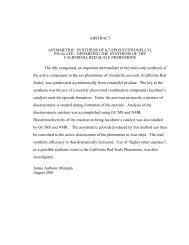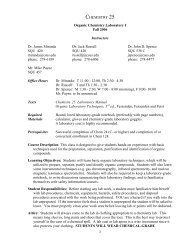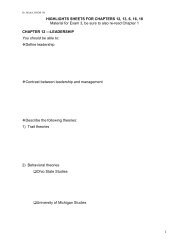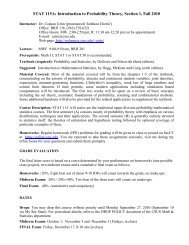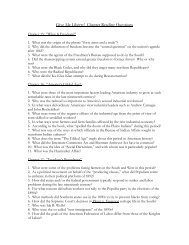History 17b: A History of the United States since 1877 Dr. Patrick ...
History 17b: A History of the United States since 1877 Dr. Patrick ...
History 17b: A History of the United States since 1877 Dr. Patrick ...
Create successful ePaper yourself
Turn your PDF publications into a flip-book with our unique Google optimized e-Paper software.
<strong>History</strong> <strong>17b</strong>: A <strong>History</strong> <strong>of</strong> <strong>the</strong> <strong>United</strong> <strong>States</strong> <strong>since</strong> <strong>1877</strong><strong>Dr</strong>. <strong>Patrick</strong> Ettinger Fall 2008, MW 12:00-1:15Office: Tahoe Hall 3097 Phone/Voice: 278-6589Email: ettinger@csus.eduWeb: http://webpages.csus.edu/~ettinger/Office Hours: Tuesdays 10:00-11:00, Wednesdays, 10:00-11:00, or by appointmentCatalog Description:Basic historical survey <strong>of</strong> <strong>the</strong> growth <strong>of</strong> urban-industrial American civilization and its rise to world power,<strong>1877</strong>-present. Note: Fulfills state graduation requirement for U.S. <strong>History</strong>. 3 units.GE Category:This course meets GE category D3 and fulfills <strong>the</strong> “Race and Ethnicity in American Society” requirement.Course Themes:“Are race relations in America better today than when my parents were my age? How did <strong>the</strong> <strong>United</strong> <strong>States</strong>develop into such an economically and politically powerful nation? What has freedom meant to differentgroups <strong>of</strong> Americans at different times? Why does <strong>the</strong> Vietnam War still continue to divide Americans? Whyis <strong>the</strong> U.S. both hated and loved abroad?”Through an examination <strong>of</strong> <strong>the</strong> major social, political, economic, and cultural developments in <strong>the</strong> <strong>United</strong><strong>States</strong> from <strong>1877</strong> to <strong>the</strong> present, this course seeks to provide you with knowledge and tools that will enableyou to pursue answers to <strong>the</strong>se and o<strong>the</strong>r questions about <strong>the</strong> past and present <strong>United</strong> <strong>States</strong>. Our main focusin this class will be on tracing <strong>the</strong> transformation <strong>of</strong> <strong>the</strong> <strong>United</strong> <strong>States</strong> from a predominantly agrarian, ruralsociety to one <strong>of</strong> <strong>the</strong> world’s most powerful industrial nations. Industrialization spawned a complicated web<strong>of</strong> changes that importantly reshaped American institutional, social, and political life. It lured immigrants,helped create large cities, transformed <strong>the</strong> workplace, and created great wealth. But it also generated newforms <strong>of</strong> poverty, fueled political corruption, and introduced a host <strong>of</strong> problems to American life. We willpay close attention to <strong>the</strong> differing ways that Americans reacted to <strong>the</strong>se changes and to <strong>the</strong>ir search for apolitical order suitable to <strong>the</strong> new economy.The course will also focus on efforts to make <strong>the</strong> <strong>United</strong> <strong>States</strong> abide by <strong>the</strong> promises <strong>of</strong> freedom and equalityenshrined in <strong>the</strong> Declaration <strong>of</strong> Independence and <strong>the</strong> Constitution. The history <strong>of</strong> <strong>the</strong> <strong>United</strong> <strong>States</strong>, writeshistorian Eric Foner, is partly a “story <strong>of</strong> debates, disagreements, and struggles over freedom.” In <strong>1877</strong>,American women, African Americans, and o<strong>the</strong>rs remained excluded from full participation as citizens in <strong>the</strong>promise <strong>of</strong> American life. Much <strong>of</strong> <strong>the</strong> drama <strong>of</strong> <strong>the</strong> nation’s history over <strong>the</strong> past century has come from <strong>the</strong><strong>of</strong>ten-courageous efforts by <strong>the</strong>se groups to expand <strong>the</strong>ir civil and political rights. Finally, we will also trace<strong>the</strong> development <strong>of</strong> <strong>the</strong> <strong>United</strong> <strong>States</strong> into a world power. In particular, we will focus on <strong>the</strong> long and bitterrivalry between <strong>the</strong> <strong>United</strong> <strong>States</strong> and <strong>the</strong> Soviet Union after World War II and <strong>the</strong> myriad ways in which thisCold War shaped American life.This is a course that encourages you to think about history not simply as “what happened in <strong>the</strong> past” but as<strong>the</strong> stories we choose to tell about <strong>the</strong> past. I hope, when <strong>the</strong> course is complete, that you will have come toyour own conclusions about <strong>the</strong> essential stories and <strong>the</strong>mes in <strong>the</strong> history <strong>of</strong> <strong>the</strong> <strong>United</strong> <strong>States</strong>.Learning Objectives: Students enrolled in <strong>History</strong> <strong>17b</strong> will:• Develop an understanding <strong>of</strong> <strong>the</strong> social, economic, cultural, and political development <strong>of</strong> <strong>the</strong> <strong>United</strong><strong>States</strong> <strong>since</strong> <strong>1877</strong>.• Deepen <strong>the</strong>ir awareness <strong>of</strong> <strong>the</strong> historical roots <strong>of</strong> American ethnic and cultural diversity and struggleswithin <strong>the</strong> nation to extend economic, civil, and political rights to all citizens.• Gain an understanding <strong>of</strong> <strong>the</strong> emergence <strong>of</strong> <strong>the</strong> <strong>United</strong> <strong>States</strong> as a world power.• Think critically about history, its purposes, and <strong>the</strong> manner in which historians and o<strong>the</strong>rs relate <strong>the</strong>history <strong>of</strong> <strong>the</strong> <strong>United</strong> <strong>States</strong>.
Required Texts: The following texts are required reading. All are available for purchase at <strong>the</strong> bookstore.Eric Foner, Give Me Liberty: An American <strong>History</strong>, vol. 2: From 1865 (Seagull edition)Upton Sinclair, The JungleRobert S. McElvaine, Down and Out in <strong>the</strong> Great Depression: Letters from <strong>the</strong> “Forgotten Man"Anne Moody, Coming <strong>of</strong> Age in MississippiCourse Requirements:1. Attendance/Readings: Class attendance is expected. I also expect you to keep up with <strong>the</strong> schedule <strong>of</strong>course readings as outlined in <strong>the</strong> course calendar. Lectures and class discussions will build upon <strong>the</strong>serequired readings, so <strong>the</strong>y should always be completed before class. When you have done <strong>the</strong> relevant readingin advance, you will find that you are able to understand and engage lectures more fully. Missing class lectureswill greatly hurt your chances <strong>of</strong> doing well on <strong>the</strong> exams.To help you get <strong>the</strong> most out <strong>of</strong> <strong>the</strong> textbook readings, I have posted questions for each reading assignmentto my webpage (http://webpages.csus.edu/~ettinger/) on <strong>the</strong> “<strong>History</strong> 17B Reading Questions” link. Iexpect that students will come to class prepared to answer any <strong>of</strong> that particular day’s reading questions ifcalled upon to do so. These questions will also serve as <strong>the</strong> basis for <strong>the</strong> textbook quizzes, discussed below.2. Textbook Reading Quizzes: Over <strong>the</strong> course <strong>of</strong> <strong>the</strong> semester, <strong>the</strong>re will be six unannounced quizzes on<strong>the</strong> day’s assigned textbook chapter. The quiz question(s) will be short answer and taken directly from <strong>the</strong>reading questions posed for that chapter on <strong>the</strong> website. Each quiz will be worth 5 points, and <strong>the</strong> two lowest<strong>of</strong> your six scores will be dropped. Textbook quizzes will be worth a total <strong>of</strong> 20 points. Because I amdropping <strong>the</strong> two lowest textbook reading quiz scores, <strong>the</strong>re will be no make-ups for textbook quizzes.3. Book Quizzes: There will be three short in-class book quizzes, given on <strong>the</strong> dates indicated on <strong>the</strong>syllabus, to cover your reading <strong>of</strong> The Jungle, Down and Out in <strong>the</strong> Great Depression, and Coming <strong>of</strong> Age inMississippi. These quizzes, which are intended to give me a sense <strong>of</strong> whe<strong>the</strong>r you are critically thinking about<strong>the</strong> material that you read, will be ei<strong>the</strong>r short answer or multiple choice. The quizzes will each be worth 20points, or 10% <strong>of</strong> your final grade.4. Exams: There will be one midterm exam and one final exam. Each will consist <strong>of</strong> an essay question andshort-answer identifications drawn from <strong>the</strong> readings, lectures, and films. The date <strong>of</strong> <strong>the</strong> midterm exam ismarked on <strong>the</strong> syllabus; <strong>the</strong> final exam will be given during <strong>the</strong> University-designated period during finalsweek. The final exam will not be cumulative. Students will need to provide blue books for <strong>the</strong> exams. Eachexam will be worth 60 points, or 30% <strong>of</strong> your final grade.Grading: Your final grade will be calculated in <strong>the</strong> following manner:Textbook Reading Quizzes 20 points 10%The Jungle Quiz 20 points 10%Down and Out Quiz 20 points 10%Coming <strong>of</strong> Age Quiz 20 points 10%Midterm Exam 60 points 30%Final Exam 60 points 30%Total 200 points 100%Percentages for Calculating <strong>the</strong> Final Letter Grade95%-100% A 83-86% B 73-76% C 63-66% D90-94% A- 80-82% B- 70-72% C- 60-62% D-87-89% B+ 77-79% C+ 67-69% D+ Below 60% FAdditional Notes: As noted above, <strong>the</strong>re will be no make-ups for textbook reading quizzes. Because <strong>the</strong>dates <strong>of</strong> <strong>the</strong> book quizzes and exams are given on <strong>the</strong> syllabus, and because I wish to be fair to everyone in<strong>the</strong> class, I will not allow make-up quizzes/examinations except in instances in which a student had adocumented medical or family emergency. This is a very firm policy. There is no extra credit in this course.
Course CalendarClass Dates and Lecture TopicsReading AssignmentsSeptember 1: LABOR DAY HOLIDAYSeptember 3: Course Requirements and ExpectationsSeptember 8: The Politics <strong>of</strong> Reconstruction Foner, Ch. 15September 10: The Realities <strong>of</strong> ReconstructionSeptember 15: An Industrializing America Foner, Ch. 16September 17: Life and Labor in <strong>the</strong> New Industrial OrderSeptember 22: Gilded Age Politics in Industrial AmericaSeptember 24: The Conquest <strong>of</strong> <strong>the</strong> Great PlainsSeptember 29: Settling <strong>the</strong> American WestOctober 1: Immigrant America (First Quiz)The JungleOctober 6: The Populist Revolt Foner, Ch. 17October 8: An Imperial Republic?October 13: Progressive Visions Foner, Ch. 18October 15: Progressive ReformersOctober 20: “Big Stick” Diplomacy and World War I Foner, Ch. 19October 22: Midterm ExamOctober 27: The 1920s: Rural vs. Urban America Foner, Ch. 20October 29: The Great DepressionNovember 3: A “New Deal” for America (Second Quiz)November 5: The Second New DealFoner, Ch. 21; andDown and Out in <strong>the</strong> Great DepressionNovember 10: American Life during World War II Foner, Ch. 22November 12: Into a Cold War Foner, Ch. 23November 17: Anticommunism in <strong>the</strong> <strong>United</strong> <strong>States</strong>November 19: Origins <strong>of</strong> <strong>the</strong> Civil Rights Movement Foner, Ch. 24November 24: The <strong>Dr</strong>ive for Civil RightsNovember 26: Civil Rights Movement (Third Quiz)Coming <strong>of</strong> Age in MississippiDecember 1: Visions <strong>of</strong> “A Great Society” Foner, Ch. 25December 3: The War on PovertyDecember 8: Vietnam and <strong>the</strong> Student MovementDecember 10: The Modern Women’s MovementsFinal Exam: Friday, December 19 th , 10:15 am - 12:15 pm.



